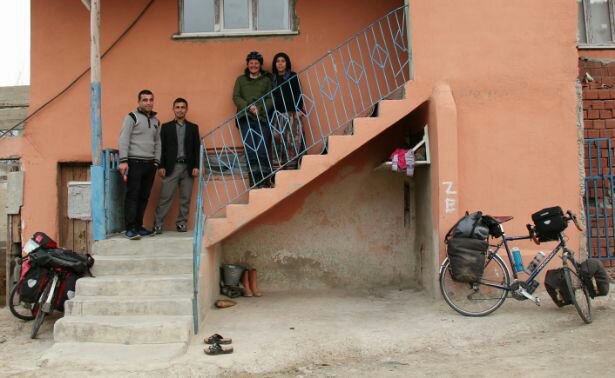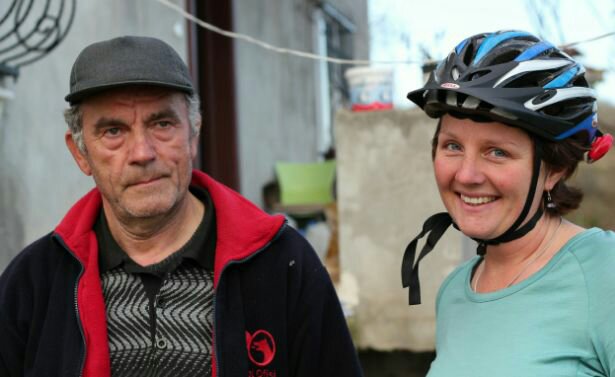We spent forty nine nights in Turkey, and used our tent on just four of them. Many of these nights indoors were impromptu acts of kindness, when we knocked on a random door at the end of a day of pedalling and were invited in to share a meal and have a warm bed for the night.
We wanted to explain how a typical encounter might go…
It’s winter. Days are short and it’s dark by 4pm. As the sun sinks below the horizon, we start scouting for houses we can approach for water and a camping spot. Petrol stations are ideal but here, away from the coast, they are few and far between. Few tourists have reason to visit this place, with its isolated villages scattered across the mountainous landscape, so there is little infrastructure to support the passing cyclist.
As we start thinking about getting our lights out, we spot a group of houses on the road ahead. We choose the biggest and wealthiest looking property, aware that the inhabitants are highly likely to feed us and not wanting to deprive a poorer household of precious supplies. Like most people in this area, the family lives on the first floor, presumably for extra warmth, being insulated by air from the ground. The ground floor is where they keep animals, cabbages and, for one night only, we hope two bicycles. They are clearly a farming family, as we hear a hidden cow mooing, although how they produce anything in this rocky environment is a mystery.
We knock on the door and hand over our letter, which explains in Turkish that we have a tent and food but would appreciate some drinking water and a small space to pitch. Our host looks at us and without reading the tattered note, motions that we should come in. Small children peep round his legs, giggling and nudging each other as we smile and wave at them. We slip our shoes off at the front door, being given a pair of slippers to wear from the large pile in the hall, and follow him into the main part of the house.
Dominated by a wood burning stove, the stuffy living room is a shock after the frigid air outside and we rapidly overheat, discarding layer after layer of clothes. A wide bench with a thin cushion for padding lines two sides of the room, on which we sit awkwardly, left with just staring children for company. We wonder whether we will sleep in here, or whether we will be faced with the guilt as our hosts give up their own bed for us. We already know the answer. Large threadbare carpets cover the floor and the only other decoration is a faded photo of Atatürk on the wall.
The man who answered the door reappears a couple of minutes later with a large bottle of perfume, which he pours into our hands. The citrus smell fills the air, masking for a few minutes the smell of frying onions wafting in from the kitchen. A hand gun sits casually on a chair in the corner and our host sees us notice it, before stuffing it under a cushion.
We use a lot of sign language to explain that we are cycling from the UK to Australia, and as our rudimentary Turkish stretches to the words for ‘job’, ‘age’ and ‘name’, throw these facts in for good measure. It’s clear that our host is eager to please but the language barrier means he’s not sure what to do, so in desperation he switches on the television which sits in the corner of the room. So begins an endless stream of traditional Turkish music videos, punctuated every so often as our host points at the screen and names which region of Turkey each style of music comes from.
At some point, his wife appears from the kitchen. She looks young – we later find out they married when she was seventeen – but is dealing remarkably calmly with the prospect of two unannounced guests to feed. These rural women have a hard life by our standards, always busy with household tasks while the men of the house sit and entertain guests or meet friends.
At dinner time, a cloth is laid in the centre of the floor, with a low table placed on it. We sit on the floor with a corner of the cloth on our lap as our hostess brings out plates of soup (which starts every good meal in Turkey) and communal dishes of kofte, salad and yoghurt. The meat is an unexpected addition, indicating that this family is relatively wealthy – in other houses we have been served only potatoes, meaning we ate as little as possible without appearing rude, for fear of depriving those who lived there.
A plastic bag of bread appears and pieces are warmed on the stove before being handed out. Bread forms the basis of every meal and is never thrown away: uneaten morsels are returned to the bag at the end of every meal, ready for next time. The wife doesn’t eat but instead hovers around the table, replenishing dishes and encouraging us to eat more.
The cold temperatures mean we drank little during the day and the heat of the room quickly makes this felt. Our host pours us glass after glass of water as we down them – he finds our thirst amusing, or perhaps a little odd, but either way it helps to diffuse any residual awkwardness as he laughs at us. We provide further entertainment after the meal when a dish of raw garlic cloves is brought out – this area is famous for garlic production. We are encouraged to eat whole cloves and we all quickly dissolve into laughter as our mouths and eyes burn with the fiery heat.
After dinner, the tea starts. A two tier tea pot sits on the stove, the top containing the tea and the bottom containing hot water. The most important phrase we have learned in Turkey is ‘çok açik’ – very weak – as even this resolute northerner can’t handle the strength of Turkish tea. The youngest daughter sits on the floor and as soon as we finish each one our host points at our glasses for her to refill them. He expresses surprise that we only have one sugar cube in each (he has three), but we know we will be served glass after glass after glass and would like to keep some of our original teeth on this trip.
At some point, the neighbours turn up. They have clearly been summoned to meet the strangers. We stand and greet them in the traditional Turkish way (our cheeks touching, first one one side and then the other), before settling back down to be stared at some more. Eventually, I pull out the knitting as a way to break the ice and the women light up, coming over to inspect my work with their critical eyes. Meanwhile, Tim uses Google Translate on his tablet computer (offline of course, in this remote corner of the country) to discuss girlfriends and career options with the older sons of the family.
Eventually, we are allowed to go to bed. There is no hot water and no obvious means of washing, so we have a quick wipe down with a flannel in the chilly bathroom (the heat of the stove doesn’t reach this far and there is no other heating), before collapsing under the piles of blankets on our hosts’ bed.
We have both travelled widely but nowhere have we been welcomed so warmly and easily into people’s lives as the past few weeks – often people who have very little. We are privileged to have these encounters and treasure the experience. Thank you Turkey.


What do you think? Please do add your thoughts below…